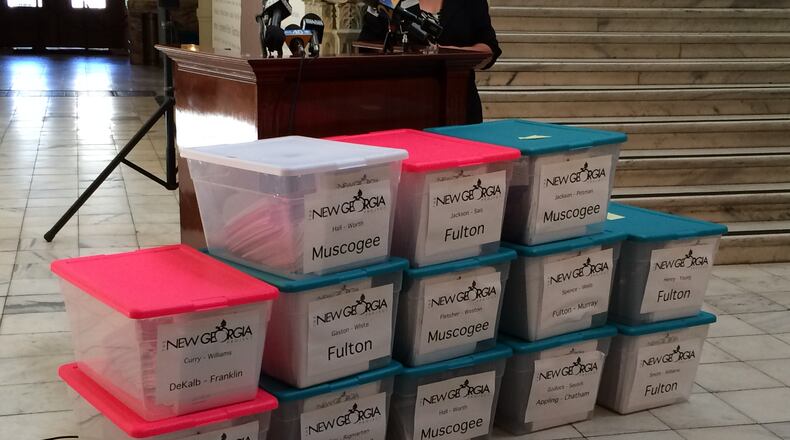Fifty-three allegedly forged voter applications are being referred to the state Attorney General's Office for possible prosecution, a decision by the State Elections Board that effectively closes the Secretary of State Office's 2014 fraud investigation involving an attention-grabbing registration drive by the New Georgia Project.
The unanimous vote Wednesday came as the case’s lead investigator said he found no wrongdoing by the group, which was founded by then-state House Democratic leader Stacey Abrams to increase the number of minorities on voting rolls.
It allows Attorney General Chris Carr to decide whether to prosecute those involved: 14 people that investigator Russell Lewis said essentially acted as independent contractors registering new voters.
“If they did good work one day, they were invited back the next,” said Lewis, who works in the Georgia Secretary of State Office. “All denied having submitted false documentation,” he said, although investigators had copies of documents that identified the forms they turned in by using transmittal sheets signed by each canvasser.
Wednesday's action provided little drama compared with the fight from three years ago, when the project's months-long effort devolved into day-to-day accusations of voter fraud, counteraccusations of voter suppression and a lawsuit won by Georgia Secretary of State Brian Kemp over allegations that he and local elections officials misplaced thousands of registration forms submitted by the project.
Kemp, a Republican, is now running for governor next year, as is Abrams. After the meeting, Kemp said the state has tried to make registration as accessible as possible but that in this particular case, the county offices that processed the forms ran into an avalanche of problems.
Those included not only the forged documents, he said, but “the handwriting was so bad or they were missing an address or birthday or last name or the state (a registrant lived in) was Alabama.”
Three years ago, “the New Georgia Project was having press conferences with 84,000 stacks of paper saying the secretary of state’s not registering voters,” Kemp said. “But when you pull the form out, you know, you’re missing an address. I mean, you can’t register someone if you don’t know where they live.”
The Rev. Raphael Warnock, the pastor of Atlanta’s storied Ebenezer Baptist Church and chairman of the project’s governing board, was mindful, however, that state law requires the group to turn in every form it touches even if it was obvious it was incomplete or someone wrote in illegible names.
He said the project in 2014 had 800 canvassers in all to help in its registration. The group has also estimated it ultimately submitted nearly 87,000 registration forms in 2014. Only 46,000 of those people made the rolls by Election Day, with an additional 18,000 having made the rolls three to nine months after the election.
“When the secretary of state first leveled his claims against us, he came out with guns blazing,” Warnock said. “Using the word voter fraud is alarmist, and it was totally unnecessary. Today’s hearing vindicated us and underscores what we knew to be the truth all along: The New Georgia Project has excellent internal controls and that we have followed the law.”
The project launched with the goal of adding 800,000 minority voters to the state’s rolls within a decade, but it came under fire almost from the beginning from even some of the state’s top Democrats for an underwhelming start amid the controversy. Among their complaints was Abrams’ $177,500 salary in 2014 as the project’s part-time CEO and president, as well as its spending of half of the $3.6 million it raised that year to pay a Washington firm used by President Barack Obama and other national Democrats as part of its registration drive.
The project, however, has continued to take an active role in registration efforts across the state, even as Abrams has stepped back from its operations. To date, those working with the project say it has submitted more than 215,000 voter registration forms, although not all those forms have been accepted.
Kemp’s office had previously said it had confirmed a few dozen cases of forged voter applications among the forms the group said it submitted as part of its 2014 drive. Investigators had also said — and repeated Wednesday — that they had no evidence of conspiracy by the group’s leaders, but that the forged applications seem to be the individual work of about 25 canvassers paid by outside companies hired by the group during its registration drive.
The office had kept the case open, however, to allow more time to fully investigate fraud claims against some of the people who registered voters on behalf of the project.
Officials looked at 208 cases in all for potential fraud. Investigators were only able to interview 14 of the canvassers; they were not able to locate the other 11.
Instances of forged voter registration forms are not unusual in Georgia, but what made this case unique was the scope of the reported problems: 16 counties reported concerns to the state.
Muscogee County Director of Elections and Registration Nancy Boren said her county was among them. The county, which has more than 105,000 registered voters, has seen an increase in people on the rolls, she said, but the effects of what some officials have called a uniquely sloppy registration effort are still being felt in her office.
Of the 10,000 or so forms that canvassers affiliated with the project turned in to her office in 2014, Boren estimated, some 80 percent were problematic. And when her office agreed at the time to provide the group a continual list of applicants who needed more information to make it onto the rolls, “these weekly reports were never picked up,” Boren said.
“The result,” she said, “is either denying them or accepting them incorrectly.”
About the Author
Keep Reading
The Latest
Featured



